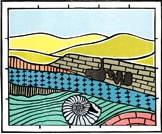Lay-by of the week:
Loch Ness and the Great Glen
Friday, 20 August, 2010. Filed under: Landscapes
This is a view down Loch Ness and the Great Glen from the A82 a few miles to the south west of Inverness. The Great Glen is Britain’s most remarkable fault line, running die-straight from the north east to the south west across Scotland. But there’s far more to it than that.
View Larger Map
The fault is a tear fault - the landscape to the north moved around 80 miles south-west then, in a second phase millions of years later, 18 miles back in the opposite direction. Loch Ness - which is, on average, around 600 feet deep owes its formation to the fault: glaciers carved out the trench from the band of shattered and pulverised rock left by it.
There is also strong evidence which links it to the Cabot Fault, which runs the length of the north west coast of Newfoundland and into the Gulf of St Lawrence. When the faults were formed, over 400 million years ago and long before the Atlantic Ocean formed, Scotland was part of the same landmass as Canada.
View Larger Map
View Larger Map
The fault is a tear fault - the landscape to the north moved around 80 miles south-west then, in a second phase millions of years later, 18 miles back in the opposite direction. Loch Ness - which is, on average, around 600 feet deep owes its formation to the fault: glaciers carved out the trench from the band of shattered and pulverised rock left by it.
There is also strong evidence which links it to the Cabot Fault, which runs the length of the north west coast of Newfoundland and into the Gulf of St Lawrence. When the faults were formed, over 400 million years ago and long before the Atlantic Ocean formed, Scotland was part of the same landmass as Canada.
View Larger Map
blog comments powered by Disqus
